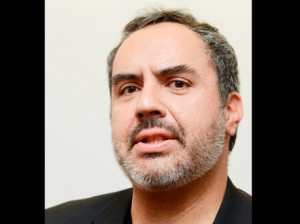By Gary Spaulding–
“Vote corrupt politicians out!” was the rallying call of a leading international anti-corruption campaigner as Jamaica yesterday joined the world in commemorating International Anti-Corruption Day.
At the same time, the Portia Simpson Miller administration was subjected to severe criticism over its tardiness in enacting the long-awaited anti-corruption law.
The Americas’ Regional Director of Transparency International, Alejandro Salas, said in moving to quash the so-called culture of corruption bedevilling the nation, the National Integrity Action (NIA) adopted the correct approach in engaging members of the public not to countenance even the spectre of the scourge of corruption.
“This must done by motivating people not to support any form of corruption, and this includes not voting for corrupt politicians,” stressed Salas to members of the judiciary, the diplomatic community, donor agencies, and international and local stakeholders at the Jamaica Conference Centre, where the function was held.
Justice Minister Mark Golding blamed the heavy focus on the International Monetary Fund’s slew of legislative demands for the Government’s tardiness in having the legislation ready to combat the scourge.
He, however, promised that the bill, now before a Cabinet legislation committee, would reach Parliament before the end of the 2013-2014 legislative year.
Action needed
Executive Director of the NIA, Professor Trevor Munroe, was not appeased, however. He stressed that smooth-sounding pronouncements must be accompanied by action if the country is to break the back of corruption far and wide. “Practical actions must complement nice-sounding praise,” he stressed.
Munroe urged the Government to exercise the same sense of urgency that it applied to the enactment of the Lottery Scam Bill.
Opposition Leader Andrew Holness earlier complained that the Government was pussyfooting on its enactment of the proposed legislation aimed at creating a single platform from which to fight corruption in high and low places. Like Salas, Holness warned against treating corruption as a cultural phenomenon.
He charged that the Government was focused on growth without paying the requisite attention to institutions that could effectively combat corruption. Both objectives, he argued, could be achieved with the correct approach.
It was highlighted at the forum that more than 75 per cent of the Jamaican populace expressed a willingness to be engaged in activities targeting anti-corruption.
For the panellists, this served as indication that the message was sinking in in the psyche of Jamaicans.
The seminar was held against the backdrop of incremental improvements in the fight against corruption but which were too slow for comfort. These improvements include a reduction in reported bribery cases from 36 per cent to eight per cent and the increase in the number of cases related to illicit enrichment before the director of public prosecutions.
Police corruption
The push against police corruption came in for mention, with more than 500 members booted from the force on corruption charges. Still, there was acceptance that Jamaica continued to languish too high on the corruption perception index.
Munroe noted that alongside these data stood more troubling ones. He said Jamaica was ranked 107th out of 144 on the index that measured favouritism of government officials. He also revealed that the country was ranked 115th out of 144 in the burden of taxation. “There is much ground left to be covered,” he said, a sentiment shared by both Holness and Golding.
He complained that the laws and arrangements governing loans and grants from the Inter-American Development Bank, the World Bank, the International Monetary Fund as well as other multilaterals were devoid of provisions to combat the scourge of corruption.
It was highlighted at the forum that between 20 and 40 per cent of aids and grants failed to realise their objectives. As such, Munroe said multilaterals must ensure that these form part of the conditionalities of financial and monetary agreements.












